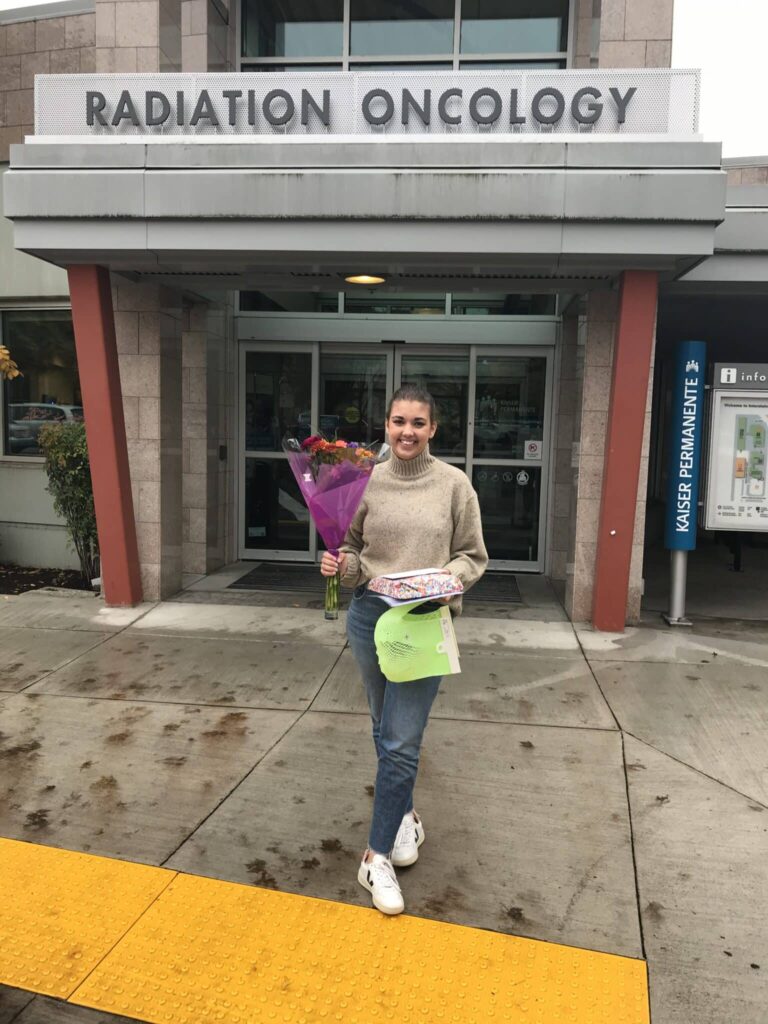Just over a year ago I had my first brain surgery. A debilitating, seven-day migraine led me to a CT scan in the emergency room, where it was discovered that I had a large mass in my brain. Just a short couple of weeks later, I had surgery to remove the tumor. Because of a few factors my care team anticipated the tumor to be benign. There was hardly a thought given to a reality other than that. But still, we would await the biopsy results for confirmation of what we already believed to be true.
My life started returning to normal after my craniotomy, although this “normal” felt awkward, like wearing a pair of shoes that didn’t quite fit right. I stumbled and fumbled my way through recovery, thankful to be gaining strength and energy every day. Time kept ticking, life kept getting better, and all that I needed were the results of the biopsy to confirm the answer that we already had.
Nearly a month had passed, and I still had no answer. I tried my hand at finding a new “post-brain-surgery” normal by returning to my studies in pursuit of a Bachelor’s in Theology and spending time with family and friends. Occasionally I thought about what the biopsy would reveal about the softball-sized mass that was removed from my head, but it was an inconsequential afterthought.
I celebrated my birthday in September of 2020 with a great sense of relief. The major threat that was a brain tumor couldn’t take my twenty-first birthday away from me. I was still alive, and there was no looking back.
Just two days after my birthday, I received a phone call from my brain surgeon. I assumed he simply wanted to check in on my post-surgery recovery as he periodically did. He asked me how I was, and I proudly reported that I was recovering extremely well and that the short-term post-op vision loss I experienced was no longer an issue.
I paced around my bedroom as he began to respond. The surgeon’s tone of voice is steady, and rarely shows much emotion or inflection. This phone call was no different, but the slight pause in conversation as I awaited his reply was agonizing. Slowly and calmly he informed me of the news that I never anticipated. The certainty of a benign tumor we thought we had was false. Instead, it was loosely determined that I had a rare mutation of an extremely fast growing and aggressive brain tumor that they knew next to nothing about. He said the words “radiation” and “chemotherapy,” signaling to me that everything was not as okay as it seemed.
With the surgeon still on the phone, I retrieved my dad from the next room, asking him to repeat what he had just told me. I knew I wouldn’t be able to relay the news I had just heard. I watched my dad’s face turn to an expression of disbelief. I laughed. Not a laugh of joy, but rather, disbelief. Our confidence in a good report had been deceitful.
Straight to the point, my dad asked “Are you saying this is cancer?”
“Cancer is a very broad term,” he said. “But yes, this can be called a type of cancer.”
We sat in my room and cried. There isn’t much to say in a moment like that. Without warning, any sense of normal that I thought I knew had become a stranger. The reality of this diagnosis had now barged into my life uninvited, and without an instruction manual.
In the months that followed, I endured the best treatment plan my oncologists could come up with: radiation, chemotherapy, eating clean, a second craniotomy, another type of chemotherapy, the works.
Being diagnosed with cancer changed everything about my life. It felt like being thrown into the deep end of a pool with no idea how to swim, while simultaneously trying to learn a new language. Everything is unfamiliarly terrifying and there is no one there to throw you a life preserver. You can’t Google “how to deal with my cancer diagnosis” for help because the articles and stories that emerge never provide the answers you are looking for.
So how do you handle it? How do you swim in the deep end that is an ugly diagnosis?
There are a billion possible ways I could answer that question, and that would still likely be insufficient. In the last year of walking this road, I have found that there isn’t a magic formula for getting through, though I desperately wish there was. But I have found that there are simple truths to hold on to.
- Take one step at a time. There are so many elements to be concerned about in a cancer journey, so much so that worry can become a natural state of being. Things like worrying about your next scan, or even catastrophizing an average day can become a norm if you allow it to. But worrying about something ten steps ahead brings no value and adds no sense of peace to your life. All you can do is take the step in front of you. And sometimes that simply means taking a deep breath.
- Enjoy the small moments. The small moments in life are beautiful. The conversations with your favorite nurse, the inside joke with a friend, getting a Band-Aid that is your favorite color after having your labs drawn; these moments are not meaningless, they are small moments of joy to be fully embraced and soaked up. These small moments, even on the worst of days, are what build our lives into a beautiful mosaic, and they are worth seeking out.
- You are still you. The you that existed before you were diagnosed with cancer is still the you that exists today. Things change, a diagnosis arises, treatment ensues, and is by no means an easy road. But you are still you. All of your skills and passions, talents and abilities, those do not have to be thrown by the wayside forever.
We know it well, but I will remind you again: Cancer is stupid.
By Mariah Corbin
Thank you to Amgen for sponsoring this story.


